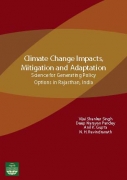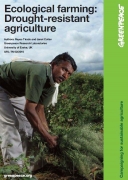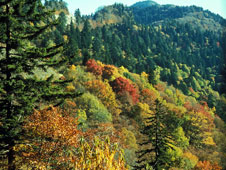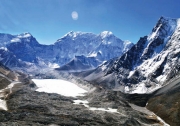Climate Change
Climate change impacts, mitigation and adaptation - Science for generating policy options in Rajasthan
Posted on 20 Dec, 2010 09:14 PM This paper by Rajasthan Pollution Control Board on climate change impacts in the context of Rajasthan seeks to address the issue of need of the society for robust knowledge to pursue strategies for mitigation as well as adaptation in order to address the challenges associated with global warming and climate change.
This paper by Rajasthan Pollution Control Board on climate change impacts in the context of Rajasthan seeks to address the issue of need of the society for robust knowledge to pursue strategies for mitigation as well as adaptation in order to address the challenges associated with global warming and climate change.
Accordingly, here a brief review of the available literature and an annotated bibliography of published research on climate change impacts, mitigation and adaptation in order to facilitate the identification of policy options in Rajasthan is provided.
Also included is the literature on how human societies contribute to environmental change and how, in turn, become vulnerable to these changes. It also explores the available knowledge on how likely ecosystem goods and services are impacted to climatic oscillations (environmental sensitivity) and the ability of rural communities to cope (social resilience) with those changes.
Ecological farming: Drought resistant agriculture – A paper by Greenpeace
Posted on 20 Dec, 2010 08:09 PM This paper by Greenpeace on ecological farming illustrates proven, modern farming approaches that help cope with drought. It elaborates on the drought-resistant crop varieties and calls for policy makers to increase funds for research on the system.
This paper by Greenpeace on ecological farming illustrates proven, modern farming approaches that help cope with drought. It elaborates on the drought-resistant crop varieties and calls for policy makers to increase funds for research on the system.
Human-induced climate change is resulting in less and more erratic rainfall, especially in regions where food security is very low. The poor in rural and dry areas will suffer the most and will require cheap and accessible strategies to adapt to erratic weather. This adaptation will need to take into account not only less water and droughts, but also the increased chance of extreme events like floods.
Biodiversity and a healthy soil are central to ecological approaches to making farming more drought-resistant and more resilient to extreme events. Practices that make soils better able to hold soil moisture and reduce erosion and that increase biodiversity in the system help in making farm production and income more resilient and stable.
Greener climate prediction by NASA shows plants slow warming
Posted on 20 Dec, 2010 06:01 PMArticle and Image Courtesy: NASA
A new NASA computer modeling effort has found that additional growth of plants and trees in a world with doubled atmospheric carbon dioxide levels would create a new negative feedback – a cooling effect – in the Earth's climate system that could work to reduce future global warming.
 A new NASA modeling effort found that in a doubled-carbon dioxide world plant growth could lessen global warming by about 0.3 degrees C globally. The same model found that the world would warm by 1.94 degrees C without this cooling feedback factored in. Image: Great Smoky Mountains National Park; Credit: National Park Service
A new NASA modeling effort found that in a doubled-carbon dioxide world plant growth could lessen global warming by about 0.3 degrees C globally. The same model found that the world would warm by 1.94 degrees C without this cooling feedback factored in. Image: Great Smoky Mountains National Park; Credit: National Park Service
Global warming mapped: Updates from Earth Observatory
Posted on 20 Dec, 2010 05:44 PMArticle Courtesy: Earth Observatory
Image Courtesy: NASA
The world is getting warmer. Whether the cause is human activity or natural variability, thermometer readings all around the world have risen steadily since the beginning of the Industrial Revolution.
Formation of glacial lakes in the Hindu Kush-Himalayas and Glacial Lake Outburst Flood risk assessment - A report by ICIMOD
Posted on 19 Dec, 2010 05:17 PM This report by ICIMOD contains an assessment of the threat facing the Hindu Kush-Himalayan region from the recent (post-1950s) and rapid formation of meltwater lakes on the surface or at the end of a large number of the region’s glaciers owing to current climate warming. Individual case studies of the catastrophic outburst (glacial lake outburst floods or GLOFs) from such glacial lakes are introduced.
This report by ICIMOD contains an assessment of the threat facing the Hindu Kush-Himalayan region from the recent (post-1950s) and rapid formation of meltwater lakes on the surface or at the end of a large number of the region’s glaciers owing to current climate warming. Individual case studies of the catastrophic outburst (glacial lake outburst floods or GLOFs) from such glacial lakes are introduced.
Water management across space and time in India – A working paper by the University of Bonn
Posted on 17 Dec, 2010 10:09 PMThis working paper by the University of Bonn attempts to give a spatial and temporal overview of water management in India. It traces how people and the successive regimes made choices across space and time from a wide range of water control and distribution technologies. The paper divides the water management in India into four periods –
- the traditional system of water management before colonial times;
- response from the colonial rulers to manage the complex socio-ecological system;
- large scale surface water development after independence; and
- finally, the small-scale community and market-led revolution.
Water footprint assessments of dehydrated onion products of Jain Irrigation Systems Ltd – A report by IFC
Posted on 17 Dec, 2010 07:05 PMThis work on water footprint assessments represents a pioneering effort on documenting the water consumption in Jain Irrigation Systems Limited’s (JISL) production of dehydrated onions and of micro-irrigation systems. It also assesses the sustainability of this water consumption and formulate response strategies.
Lake 2010: Wetlands, Biodiversity and Climate Change, Bangalore
Posted on 14 Dec, 2010 10:51 AMLake 2010: Wetlands, Biodiversity and Climate Change
Theme: Wetlands Conservation and Management
Delhi Sustainable Development Summit (DSDS) 2011, TERI, New Delhi
Posted on 10 Dec, 2010 03:41 PMDelhi Sustainable Development Summit (DSDS) 2011
Theme: "Tapping Local Initiatives and Tackling Global Inertia"
Water partnerships towards meeting the climate challenge, 6-7th Jan 2011, Chennai
Posted on 07 Dec, 2010 05:23 PMThe Center of Excellence for Change in Colloboration with GoTN IAMWARM Project and UNICEF have organised a Conference Cum Workshop " Water Partnerships towards Meeting the Climate Challenge" on 6th&7Th Jan





